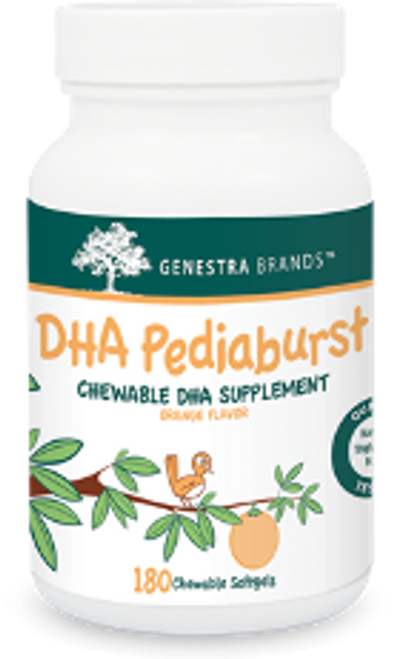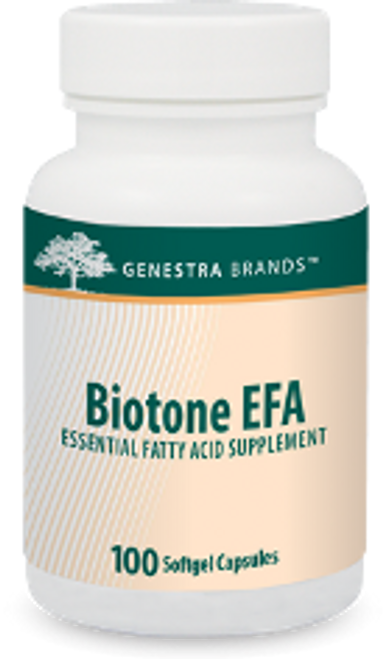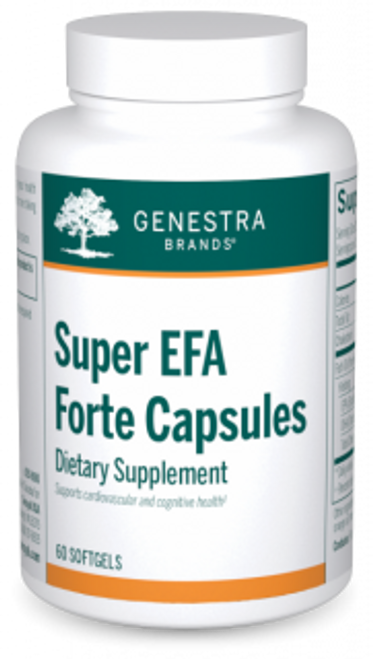Product Overview
Genestra Super Neurogen DHA- 30 Softgel Capsules
• DHA formula from algae oil • 200 mg DHA per dose • Helps support neurological function • Dricelle patented process • Ensures 100% emulsification of oil into micelle droplets • Purity guaranteed • No artificial colors, flavors or preservatives
Super Neurogen DHA is a unique source of docosahexaenoic acid (DHA) derived from algae, specifically formulated to support neurological function.
Additional product info: Dietary sources of (n-3) FA are limited. The shorter chain (n-3) FA a-linolenic acid (ALA) is found in many plants, but the longer chain EPA and DHA are produced almost exclusively by cold water algae, which are in turn ingested by fish. Although humans cannot synthesize the (n-3) double bond, we do have the elongase and desaturase enzymes needed to convert ALA to EPA and DHA. However, this conversion is an inefficient process. The conversion of ALA to EPA may be further reduced as a result of large amounts of (n-6) FA in the diet, which compete for the same enzymes. Consequently, experts currently recommend the consumption of preformed EPA and DHA, rather than ALA, to meet dietary goals for (n-3) FA (2). EPA and DHA are crucial to brain development and normal brain functioning. The n-6 and n-3 series of long-chain polyunsaturated fatty acids (LC-PUFA) have an important role during gestation, lactation and infancy since they are constituents of cell membrane phospholipids and precursors of eicosanoids. LC-PUFA are biosynthesised from essential fatty acids (EFA) (linoleic acid, LA, 18: 2n-6, and linolenic acid, LNA, 18:3 n-3) by successive desaturation and elongation steps in the intestine, liver and brain. Both, arachidonic acid (AA, 20:4 n-6) and docosahexaenoic acid (DHA, 22:6 n-3), are found in neural structures and particularly DHA is a component of neurone membranes and external segments of photoreceptors in the retina (3). As such, algal DHA supplementation supports neurological function (4). DHA supplementation of breastfeeding mothers results in higher child plasma phospholipid DHA contents during supplementation and a higher Bayley Psychomotor Development Index at 30 months of age but results in no other advantages either at or before this age (5).
DHA is particularly important to brain functioning due to its influence on neural membrane properties, which modulate cell signalling. DHA concentration in the brain decreases with age in humans and this has been postulated to be consequential to the age-related deterioration in central nervous system functions (6). A recent clinical study examined individual effects of 900mg/d algal DHA as a nutritional supplement for age-related cognitive decline (ARCD). This randomized, double- blind, placebo- controlled study (n=485) found significantly fewer CANTAB Paired Associate Learning errors with algal DHA at six months versus placebo. Positive effects on Verbal Recognition Memory (p<0.02) and significant decreases in resting heart rate with DHA (p<0.03) were observed, indicating improved learning and episodic memory functions and cardiovascular benefits for ARCD
References: 2 Neff LM, Culiner J, Cunningham-Rundles S, Seidman C, Meehan D, Maturi J, Wittkowski KM, Levine B, Breslow JL. Algal docosahexaenoic acid affects plasma lipoprotein particle size distribution in overweight and obese adults. J Nutr. 2011 Feb;141(2):207-13. Page 207, Introduction, 2nd paragraph 3 Gil A, Ramirez M, Gil M. Role of long-chain polyunsaturated fatty acids in infant nutrition. Eur J Clin Nutr. 2003 Sep;57 Suppl 1:S31-4. Page S31, Introduction; 5 Jensen CL, Voigt RG, Prager TC, Zou YL, Fraley JK, Rozelle JC, Turcich MR, Llorente AM, Anderson RE, Heird WC. Effects of maternal docosahexaenoic acid intake on visual function and neurodevelopment in breastfed term infants. Am J Clin Nutr. 2005 Jul;82(1):125-32. Page 125, Abstract, Conclusion; Page 131, Conclusion 6 Danthiir V, Burns NR, Nettelbeck T, Wilson C, Wittert G. The Older People, Omega-3, and Cognitive Health (EPOCH) trial design and methodology: A randomised, double-blind, controlled trial investigating the effect of long-chain omega-3 fatty acids on cognitive ageing and wellbeing in cognitively healthy older adults. Nutr J. 2011 Oct 20;10(1):117. Page 2, Background, 2nd paragraph
Other ingredients: Bovine gelatin, glycerin, purified water, turmeric, annatto seed extract Contains: Soy








